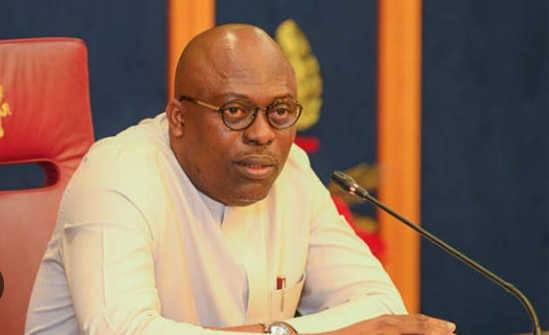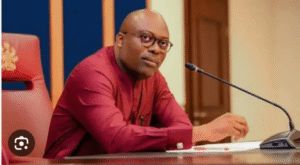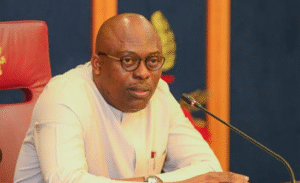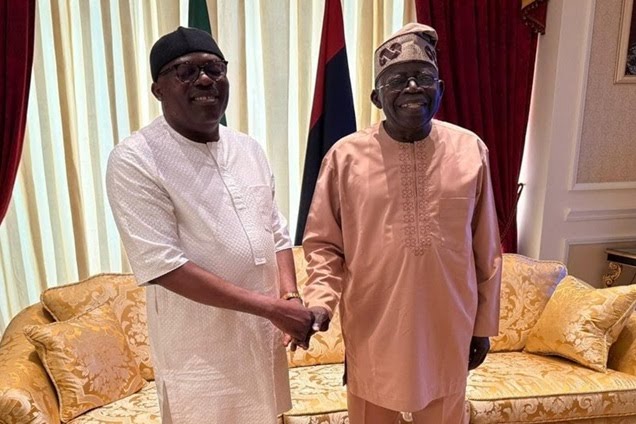
Hurdles Before Fubara After Rivers Emergency Rule
- Nigeria News
- 28.09.2025
- No Comment
- 33
Hurdles Before Fubara After Rivers Emergency Rule
As the Rivers State Governor, Siminalayi Fubara, resumed duty after a six-month layoff following the emergency rule declared in the state by President Bola Tinubu, new challenges await him as he navigates complex political realities.
The saying “uneasy lies the head that wears the crown” aptly describes the situation Rivers State Governor Siminalayi Fubara finds himself in. Although he is the chief security officer of the state, he is currently facing a dilemma where moving forward seems as challenging as retracing his steps, echoing the sentiments of Ghanaian poet Kofi Awoonor in his legendary work Songs of Sorrow.

With the end of emergency rule and the reinstatement of democratic institutions, Governor Fubara and lawmakers are back in office. However, events are unfolding rapidly, signaling hurdles he must address head-on.
Vice Admiral Ibok-Ete Ibas, who administered the state during the emergency rule, prided himself on successfully overseeing the August 30 local government elections conducted by the Rivers State Independent Electoral Commission (RSIEC) led by Dr. Mivahel Odey.
The All Progressives Congress (APC) won 20 out of 23 LGAs, while the Peoples Democratic Party (PDP) secured the remaining three. Governor Fubara notably lost his Opobo/Nkoro LGA to the opposition party. All chairmen and councillors have since received their Certificates of Return and assumed office.

The Supreme Court nullified RSIEC’s earlier exercise under Fubara, effectively enabling Nyesom Wike to reclaim control of the local government structures and the state House of Assembly. Currently, 27 lawmakers, including Speaker Martin Amaewhule, are loyal to the FCT Minister.
The Amaewhule-led Assembly held its first plenary on September 18, sending strong signals to the governor. They convened at the legislative quarters on Aba Road as the Assembly Complex on Moscow Road undergoes reconstruction following the political crisis.
During the plenary, the House requested Fubara to forward commissioner nominees for screening, submit the Rivers State Appropriation Bill, and review how funds were spent during the six months of emergency rule.
The Peace Pact
Speaker Amaewhule stated, “This House has resolved to keep to the terms of the peace pact with the governor and all stakeholders.” In Abuja, Wike echoed, “Anything that will bring peace, I’m for it.” Yet, mutual suspicion still hovers over the key players.
Call for Synergy
Omenazu Jackson, Chancellor of the International Society for Social Justice and Human Rights, advised the governor to “stoop to conquer” by applying wisdom in dealing with LG chairmen and Assembly members. According to him, if all parties align with the aspirations of Rivers people, progress will follow.

No Bullying in Democracy
Jackson stressed that democracy does not tolerate bullying. “Nobody should bully the governor, and the governor should boldly defend the sacred mandate given to him by the state,” he said.
Stability Before 2027
Lawyer and human rights advocate Mr. Higher King expressed optimism that the state would remain stable until the 2027 elections. He noted that all parties were affected by the emergency rule and would prioritize their political futures over disagreements.
Sunny Dada, Chairman of the Civil Liberties Organisation (CLO), emphasized the importance of cementing reconciliation and healing processes to ensure stability. He called on the governor to establish a Truth and Reconciliation Committee comprising impartial individuals with integrity to address grievances stemming from the crisis.
Dada noted that the crisis deepened mistrust between ethnic groups, particularly the upland and riverine communities. According to him, reconciliation would allow these groups to share “bitter truths” and move forward.
Dada also urged the governor to open the financial books of the state to ensure accountability. He highlighted the need to clarify how much was received and spent under the former administrator during the emergency rule.
He further advised the governor to suspend the existing budget and present a new Appropriation Bill, aligning with the Assembly’s demand for greater transparency.
Despite the end of emergency rule, Elder statesman Sunny Chukumele believes Fubara is no longer in charge, alleging that Wike has successfully captured the state. He expressed concerns about the fate of the three lawmakers loyal to Fubara, suggesting they might face sanctions from the Speaker.
Time will tell if the newfound unity among political gladiators will hold before the 2027 general elections. The coming months will test Governor Fubara’s ability to assert his authority, navigate political complexities, and prioritize the interest of Rivers State over personal ambitions.
This article explores the key hurdles before Governor Fubara as he resumes his duties after Rivers emergency rule, highlighting the need for reconciliation, transparency, and strategic leadership.






